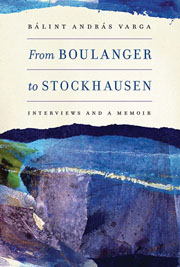Book contents
- Frontmatter
- Dedication
- Contents
- Foreword
- Acknowledgments
- Part One Interviews
- Preface to the Interviews
- Composers
- Conductors
- Instrumentalists
- Alfred Brendel
- Yehudi Menuhin
- Isaac Stern
- Tibor Varga
- Singers and a Record Producer
- A Teacher
- Music Administrators
- Snippets
- Part Two A Memoir
- Notes in Retrospect
- Index
- Miscellaneous Endmatter
Yehudi Menuhin
from Instrumentalists
Published online by Cambridge University Press: 05 January 2014
- Frontmatter
- Dedication
- Contents
- Foreword
- Acknowledgments
- Part One Interviews
- Preface to the Interviews
- Composers
- Conductors
- Instrumentalists
- Alfred Brendel
- Yehudi Menuhin
- Isaac Stern
- Tibor Varga
- Singers and a Record Producer
- A Teacher
- Music Administrators
- Snippets
- Part Two A Memoir
- Notes in Retrospect
- Index
- Miscellaneous Endmatter
Summary
I heard Yehudi Menuhin on two occasions: sometime in the 1960s, in Budapest, he played Bartók's Violin Concerto, and in the mid-1970s Frank Martin's Polyptyque. On both occasions, his music-making was a revelation.
I had heard Bartók's work a number of times with Hungarian violinists—Menuhin's rendition was altogether on a different plane. For the first time, the music soared naturally, it never occurred to me to be impressed by the soloist's achievement in playing a “modern” composition, as had previously been the case. Menuhin showed us that the concerto was firmly rooted in tradition, and it was a masterpiece of the order of Beethoven's or Brahms's.
Frank Martin's violin concerto, composed in 1973, one year before the composer's death, was dedicated to Menuhin. It was the first time I had heard a work by Martin and I was excited by its originality, its harmonic language colored by the Swiss composer's individual approach to dodecaphony. The experience was in the back of my mind when it became my responsibility to promote his music for Universal Edition some twenty years later.
Menuhin's greatness as an artist was for me never in doubt. His public utterances, however, eventually made me question his sincerity. It was all too good to be true. There was no cause on which he did not take a noble position, he was always on hand to support, to admonish, to speak up for and against.
- Type
- Chapter
- Information
- From Boulanger to StockhausenInterviews and a Memoir, pp. 129 - 134Publisher: Boydell & BrewerPrint publication year: 2013



